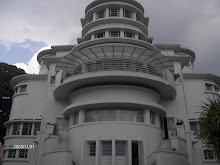Periods of English Literature
Disusun untuk memenuhi tugas Foundations of Literature (IG 105)
Disusun Oleh :
Nama : Meliya Adriati
NIM : 0808470
Kelas : 3B
Periods Of English Literature
The term English literature refers to literature written in the English language, including literature composed in English by writers not necessarily from England; Joseph Conrad was born in Poland, Robert Burns was Scottish, James Joyce was Irish, Dylan Thomas was Welsh, Edgar Allan Poe was American, V.S. Naipaul was born in Trinidad, Vladimir Nabokov was Russian. In other words, English literature is as diverse as the varieties and dialects of English spoken around the world. In academia, the term often labels departments and programmes practising English studies in secondary and tertiary educational systems.
Historians have divided English literature into periods so that make it easier to be learnt by everyone or students of literature subject who want to recognize it. The numbers, dates or the names of the periods sometimes vary, but here is the list which is used by most of them.
1. 1st period: 450-1066 Old English (Anglo-Saxon) Period
(From the invasion of the Celtic England by Germanic tribes to the conquest of England in 1066 by the Norman French)
• Literature:
Poetry was written in the vernacular – Anglo Saxon – called Old English.
• Beowulf – the greatest of Germanic epics.
• Caedmon and Cynewulf wrote on religious and biblical themes.
• St. Augustine of Canterbury was the first who found literature that are dates to the early Christian monasteries.
• Alfred the Great translated several books of Latin prose into Old English, and also recorded the important events in England.
2. 2nd period: 1066-1500 Middle English Period
• About 1500 – the standard literary language took the form of “modern English”
• 1100-1350 – the non-Latin literature was produced in the French dialect (by the invades who were then the ruling class of England)
The important work of this period was Guillaume de Lorris’ and Jean de Meun’s Roman de la Rose. Later on, the narrative vernacular – middle English – became the literary language especially for religious writings
The secular literature became more popular in the second half of the 14th century. This was the age of Chaucer and John Gower. Remarkable works of this time were William Langland’s great religious and satirical poem Piers Plowmen, and Thomas Malory’s the famous prose romance called Morte d’ Arthur.
The 15th century poets: “Scottish Chaucerians”
King James I and Robert Henryson occupied chief position.
15th century was remarkable for popular literature addressed to the upper class. It was the age of excellent songs and of folk ballads, and was the time of the miracle and morality plays.
3. 3rd period: 1500-1600 The Renaissance (Early Modern) Period
a. 1558-1603 Elizabethan Age
The Elizabethan era saw a great flourishing of literature, especially in the field of drama. William Shakespeare stands out in this period as a poet and playwright as yet unsurpassed. that he wrote what have been considered his greatest plays: Hamlet, Romeo and Juliet, Othello, King Lear, Macbeth, Antony and Cleopatra, and The Tempest. Other important figures in Elizabethan theatre include Christopher Marlowe, Thomas Dekker, John Fletcher and Francis Beaumont
b. 1603-1625 Jacobean Age
The poet and dramatist Ben Jonson was the leading literary figure of the Jacobean era (The reign of James I).
c. 1625-1649 Caroline Age
The turbulent years of the mid-17th century, during the reign of Charles I and the subsequent Commonwealth and Protectorate, saw a flourishing of political literature in English. The two most important poets of Oliver Cromwell's England were Andrew Marvell and John Milton.
d. 1660-1700 Restoration Period
Prose in the Restoration period is dominated by Christian religious writing, but the Restoration also saw the beginnings of two genres that would dominate later periods: fiction and journalism.
e. 1700-1745 The Augustan Age
Some of the most outstanding poet of the age are Alexander Pope, James Thomson, and Edward Young. So for the writers, there are Jonathan Swift, Joseph Addison, and Richard Steele.
f. 1785-1830 The Romantic Period (Romanticism)
William Wordsworth and Samuel Taylor Coleridge brought a new emotionalism and introspection, and their emergence is marked by the first romantic Manifesto in English literature.
g. 1832-1901 The Victorian Period
It was in the Victorian era (1837-1901) that the novel became the leading form of literature in English. Some of fhe best known writers are Charles Dickens, the Bronte Sisters, and Lewis Caroll.
h. 1914- The Modern Period
The movement known as English literary modernism grew out of a general sense of disillusionment with Victorian era attitudes of certainty, conservatism, and objective truth. The movement was greatly influenced by the ideas of Romanticism, Karl Marx's political writings, and the psychoanalytic theories of subconscious - Sigmund Freud. Important novelists between included Virginia Woolf, E. M. Forster, Evelyn Waugh, P.G. Wodehouse and D. H. Lawrence. T. S. Eliot
i. 1945- Post Modernism
Postmodern literature, like postmodernism as a whole, is difficult to define and there is little agreement on the exact characteristics, scope, and importance of postmodern literature.
Sources:
http://en.wikipedia.org/wiki/English_literature
http://englishliterature99.wordpress.com/periods-of-english-literature/
Jumat, 02 Oktober 2009
Langganan:
Posting Komentar (Atom)


Tidak ada komentar:
Posting Komentar